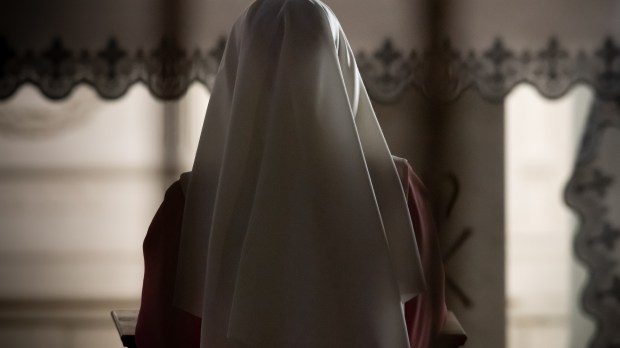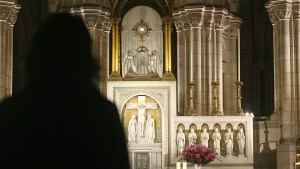The sun is down, and the house lights are lowered. The Sisters have prayed Compline and the patients are settled for the day. The day is just ending for the Sisters at Rosary Hill Home –for all except one. One Sister is just beginning her work as she commences her weekly turn on Night-watch. One of the unique parts of life as a Hawthorne Dominican is the privilege and challenge of staying up all night to care for the people God has entrusted to us. There are many ways to look at Nightwatch – the nursing, being a comforting presence, the continuation of our charism, inspiration for our own contemplation – but here I would like to look at two aspects which have meaning for every Christian: the spiritual traditions of keeping vigil and of penance.
Penance often evokes images of extreme voluntary mortifications. For example, our own Dominican Sister, St. Rose of Lima, is known for her life of penances which are admirable but hardly imitable. We know that extreme penances cannot be the only form of sacrifice because so few are called to hairshirts or scourging. But all Christians are called to some form of penance. Penance, at its root, is not about suffering but about love. It is a sacrifice we make, offered to God for love of Him and love of neighbor, and it can change the world and our hearts.
During Advent and Lent we are exhorted to “make straight the way of the Lord” and this is, in part, by penances we take on. But, in addition to these seasons of preparation, Christians can embrace penance simply by embracing everything that is part of our normal lives. When we look at Nightwatch as a penance, it is in this sense. For us here, Nightwatch is not a penance primarily because it is difficult, but because it is an act of love. We choose it when we freely chose life in this community and as a loving sacrifice, it can spiritually affect our patients, our world, and our own hearts.
In any state or time of life, there are penances built-in. Sometimes they are very obvious spiritual exercises such as fasting, making a pilgrimage, praying the rosary on one’s knees, etc… However, for most of us, the circumstances of our normal lives provide us with the opportunity to grow in love and union with Christ by uniting our ordinary struggles with His Passion. Every child up with an elderly parent; or parent commuting long hours to provide for his or her family; every student who gives up going out with friends in order to study; every lonely person who makes of that loneliness a gift to God and a prayer for others – these are the sorts of penances that prepare our hearts for the Lord and are available to everyone.
Nightwatch, and all these “ordinary” penances, ought to be embraced with gratitude because they mean that we can always remain close to our Crucified Lord. In every state of life there is always the call from the Lord to keep our hearts awake.
Scripture is replete with exhortations to remain vigilant, to watch.
“In the silent hours of the night, bless the Lord” (Compline antiphon, Tuesday).
“My soul is longing for the Lord more than watchman for daybreak” (Psalm 130).
“Keep watch! Stay awake!…do not let him find you sleeping” (Mark 13:33a, 36).
Do we think of all the people who are awake as we sleep? Young parents, police officers, soldiers, and many others find themselves awake to keep watch as everyone else takes rest. In many monastic communities they rise for the night Office – to praise the Lord and intercede for the world even as it sleeps. Many of the saints, including our own Holy Father Dominic, were known for their lengthy prayer vigils in the night. And although a Sister on night duty is working, she is also watching. She does not watch alone but watches with Christ.
As Dominican Sisters of Hawthorne, we understand Nightwatch as a time when Our Lady walks the halls with us. And where His Mother is, so is Christ. We keep watch over the patients and the house itself, but also over our own hearts – something every Christian is called to do.
The way that we attend to our sleeping patients is instructive as we think about what it means to keep vigil. At night, the Sister on duty is responsible for making sure everyone is safe and cared for. As a Sister goes through night she is attentive to the details of each patient. Do they appear cold or hot? Uncomfortable? Content? Are they awake and lonely? Many of our guests are physically unable to do much for themselves, but in a broader perspective everyone is helpless and vulnerable as they sleep. That is why we pray at compline, “Protect us Lord, as we stay awake, watch over us as we sleep. That awake we may keep watch with Christ, and asleep rest in His peace.” We acknowledge that we cannot watch over ourselves once we fall asleep.
The Sister on Nightwatch stays awake to keep watch with Christ and enable our patients to sleep in His peace. This is a fitting analogy for what it means to keep vigil over our hearts. Some of us literally keep the vigil at night, but we all keep vigil spiritually. And are our hearts any less vulnerable or helpless than the sleeping sick here? Who will watch over our hearts and let them rest in Christ’s peace if we are inattentive to them? Just as we would never leave our patients in danger, we can look at our hearts the same way. We must take care not to allow anything into them that could harm them or make them an unfit dwelling place for the Blessed Trinity.
Keeping watch can be a beautiful and peaceful time, but is also a time in which the Sister has to be realistic about her weaknesses. We learn that certain things help us to stay awake and certain things do not, and that it varies between people. Some might need coffee and a meal to stay awake, others know that tea and light eating will help them get through the night. Some things are bad for everyone – eating ice cream and drinking only soda is going to make anyone feel sick! Likewise, as we attend to our hearts, we learn what helps us and what leads us away from vigilance. Some things are bad for everyone (sin), others can vary from person to person (what one can watch, read, or listen to) but we all must continue to learn so that we can stay awake.
One story from Nightwatch sums up these two themes clearly.
We had a woman here who was a newer patient. She was settling into life here very well and usually slept through the night. One night, however, she woke up with a lot of pain at 1 or 2 in the morning. She was so uncomfortable and so scared. We quickly got her medicine and did everything we could to get her as comfortable as possible. But medicine takes time to work. It is easy to feel helpless as one waits, but even this can be a gift as we embrace our helplessness by remembering the helplessness Christ embraced. I told her I would stay with her while we waited and so we sat together in the dark. Sometimes we talked, sometimes we prayed, and sometimes I just held her hand. She thanked me for being there and I told her I would stay until she fell asleep, and that if someone else called, I would come back to her as soon as I could. With remarkable peace, she accepted my encouragement to unite her sufferings to Christ and my reassurances that her suffering was not meaningless. But more than any long speeches, she simply knew I was there and that I was glad to be there. I stayed with her until she was able to fall asleep. The next day, I went in to see how she was. She did not remember my name, but when I walked into the room, she said, “Oh it’s you! You are the one that stayed with me.” I was so touched by her words and assured her that, yes, I was the one who had been on watch the night before. It was a simple, but moving, conversation.
This story, although ordinary in our life here, brings together the elements of penance and keeping vigil in a beautiful way – and shows us why all Christians are called to both. The element of penance is clear – certainly her suffering is a penance for her, but even one’s own feelings of concern, helplessness, and dropping everything else to be with the person are pleasing offerings to God. Love for Christ and for that person is what makes those difficulties possible and even easy to endure. And to see by faith that you are not just sitting with this suffering woman, but with the suffering Christ Himself, is a great privilege. He is unmistakable in those silent hours of the night.
Keeping vigil is also quite obvious in this story – to physically stay awake with her, to attentively watch to see if she is becoming more comfortable, to pray for her and with her, and to encourage her in her own offering to God. But she unknowingly summed up why any of us keep vigil or practice penance. We “stay awake” and embrace our Crosses, ultimately, in the hope of someday hearing Our Lord greet us just as this woman greeted me: “You are the one who stayed with Me.”
~
If you would like to know more about the Dominican Sisters of Hawthorne, please visit our website www.hawthorne-dominicans.org , or call 845-745-1319.


